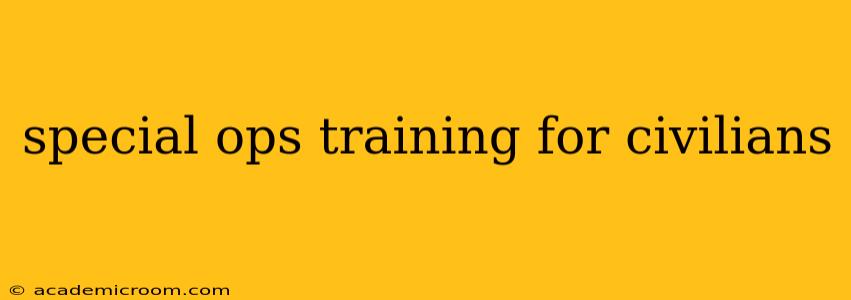The allure of special operations training is undeniable. Hollywood often portrays highly skilled individuals performing incredible feats, fueling a desire among civilians to experience a taste of this elite world. However, the reality is far more nuanced than the cinematic portrayals. While you won't find a program replicating Delta Force training for the general public, various options exist offering challenging and rewarding experiences that draw inspiration from special operations methodologies. This article explores these options, addresses common questions, and clarifies the crucial distinctions between military special forces training and civilian programs.
What kind of Special Ops Training is Available to Civilians?
Several civilian training programs are available that mimic certain aspects of special operations training, focusing on fitness, tactical skills, and mental resilience. These programs typically emphasize:
-
Advanced Physical Fitness: Expect rigorous physical training pushing your endurance, strength, and agility to their limits. Think intense calisthenics, obstacle courses, long-distance runs, and swimming drills—all designed to build exceptional physical stamina.
-
Combat Skills: Many programs offer instruction in hand-to-hand combat, firearms proficiency (often limited to non-lethal options or restricted by local laws), and basic tactical maneuvers. This training emphasizes self-defense and situational awareness.
-
Survival Skills: Some programs include wilderness survival training, teaching essential skills like navigation, shelter building, fire starting, and water procurement. This prepares participants for challenging environments and emphasizes resourcefulness.
-
Mental Fortitude Training: Special operations training heavily emphasizes mental toughness. Civilian programs often incorporate this aspect through challenging physical and mental exercises designed to build resilience, stress management skills, and decision-making under pressure.
Is Civilian Special Ops Training as Hard as Military Special Forces Training?
No. It's crucial to understand the profound difference in intensity and purpose. Military special forces training is designed to prepare individuals for life-threatening situations, requiring years of dedication, rigorous selection processes, and constant evaluation. Civilian programs, while demanding, lack the extreme pressure, lethal force scenarios, and overall intensity of military training. They are designed to challenge individuals physically and mentally, but the risks and consequences are significantly different.
What are the benefits of civilian special ops training?
The benefits extend beyond the physical. These programs offer:
- Increased Physical Fitness: The rigorous training undeniably improves overall physical fitness and health.
- Enhanced Self-Confidence: Successfully completing a challenging program fosters a strong sense of accomplishment and self-belief.
- Improved Mental Resilience: Facing physical and mental challenges builds mental fortitude and stress management skills.
- Self-Defense Skills: Participants gain practical self-defense skills and increased situational awareness.
- Teamwork and Leadership: Many programs emphasize teamwork and leadership skills, promoting collaboration and communication.
What is the cost of civilian special ops training?
Costs vary considerably based on the program's length, location, and intensity. Expect to pay anywhere from a few hundred dollars for a weekend course to several thousand for more extensive programs.
Where can I find civilian special ops training programs?
Researching reputable organizations offering civilian special operations-inspired training is crucial. Look for established programs with experienced instructors and a focus on safety. Online searches, referrals from experienced individuals, and careful review of program details are essential steps in your decision-making process.
What is the difference between "tactical" and "special ops" training for civilians?
While often used interchangeably, there's a distinction. "Tactical" training usually focuses on specific self-defense or combat techniques. "Special Ops" training encompasses a broader range of skills, including physical conditioning, survival techniques, and mental resilience, drawing inspiration from the holistic training of special forces units.
Are there any age or physical fitness requirements for civilian special ops training?
Requirements vary significantly depending on the program. Many programs have minimum age restrictions (often 18 or 21) and require a certain level of baseline physical fitness. Carefully review the specific requirements of each program before enrolling.
Remember, while civilian special ops training can be incredibly challenging and rewarding, it doesn't equate to military special forces training. The goal is personal growth, improved fitness, and enhanced skills, not to become a special operations soldier. Approach the experience with realistic expectations and a focus on safe, responsible participation.
